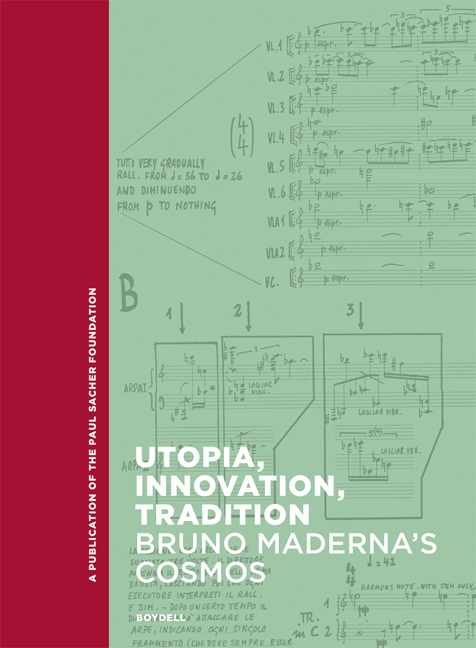Book contents
- Frontmatter
- Contents
- INTRODUCTION
- STAGING AND PERFORMING SOUNDS: A GLANCE THROUGH THE LAST THEATRICAL WORK
- BUILDING SOUNDS: THE COMPOSER
- CREATING SOUND: THE MUSIC BEYOND/WITHOUT THE STAGE
- REINVENTING SOUNDS: DIALOGUES WITH MUSIC OF EVERY EPOCH AND STYLE
- ACROSS BORDERS: THE CONDUCTOR AND THE INTERPRETER
- SEARCHING FOR ROOTS: THE DEVELOPMENT OF A STYLE
- STAGING AND PERFORMING TEXTS: A GLANCE THROUGH EARLY DRAMATURGICAL AND VOCAL WORKS
- Chronology Of Bruno Maderna’s Works
- Selected Bibliography
- Index
“This Bruno Looks Like Fiorello”: Maderna in the U.S.A. (1965–72)
Published online by Cambridge University Press: 17 January 2024
- Frontmatter
- Contents
- INTRODUCTION
- STAGING AND PERFORMING SOUNDS: A GLANCE THROUGH THE LAST THEATRICAL WORK
- BUILDING SOUNDS: THE COMPOSER
- CREATING SOUND: THE MUSIC BEYOND/WITHOUT THE STAGE
- REINVENTING SOUNDS: DIALOGUES WITH MUSIC OF EVERY EPOCH AND STYLE
- ACROSS BORDERS: THE CONDUCTOR AND THE INTERPRETER
- SEARCHING FOR ROOTS: THE DEVELOPMENT OF A STYLE
- STAGING AND PERFORMING TEXTS: A GLANCE THROUGH EARLY DRAMATURGICAL AND VOCAL WORKS
- Chronology Of Bruno Maderna’s Works
- Selected Bibliography
- Index
Summary
Maderna made his debut on the American music scene on 21 February 1965 with the performance of Luigi Nono's Intolleranza 1960 in Boston, four years after its memorable opening in Venice. Prior to this, Maderna's fame as a conductor in the United States was mainly limited to communications from European contemporary music festivals, radio broadcasts, or the few available recordings. Who could remember the reviews in several American newspapers in 1932–33 that talked about a child prodigy, a certain Brunetto Grossato, who was causing quite a stir on the other side of the Atlantic? The child was director of the Diano Marina town band and the seventy-eight-member orchestra at Venice's Teatro La Fenice, often compared to Willy Ferrero and acclaimed as “the coming Toscanini.” And much the same could be said about Maderna the composer. Even in the early 1960s, the chances to hear his works live were few and far between, limited to some electronic music auditions and to the few chamber music pieces performed on tour by European musicians and only rarely by local artists. The fate of some of his important works is, however, bound up with events in America; for example, an early Requiem (1946), presumed lost, which Virgil Thomson speaks of in glowing terms, in an unsuccessful attempt to promote its performance in the United States; or his Tre liriche greche (1948), whose first known performance seems to have taken place in Kansas City on 27 February 1959, conducted by Harold Decker, who then released it on record.
The staging of Intolleranza 1960 at the Opera Company in Boston under the direction of Sarah Caldwell may have been beset by numerous technical difficulties and political protests, but it was, as the set designer Josef Svoboda recalls, a “sensational” production. Maderna's conducting played a crucial role in this. Joseph Silverstein, the concertmaster of the Boston Symphony Orchestra from 1962, remembers that “he was highly respected by the Boston Symphony musicians who worked with him.”
- Type
- Chapter
- Information
- Utopia, Innovation, TraditionBruno Maderna's Cosmos, pp. 277 - 298Publisher: Boydell & BrewerPrint publication year: 2023

